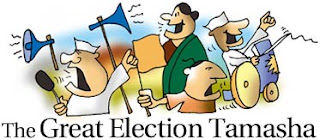 |
‘Elections, as you well know, Ganapathi, are a great Indian tamasha, conducted at irregular intervals and various levels amid much fanfare. It takes the felling of a sizeable forest to furnish enough paper for 320 million ballots, and every election has at least one story of returning officers battling through snow or jungle to ensure that the democratic wishes of remote constituents are duly recorded. No election coverage is complete, either, without at least one picture of a female voter whose enthusiasm for the suffrage is undimmed by the fact that she is old, blind, unlettered, toothless or purdah-clad, or any combination of the above. Ballot-boxes are stuffed, booths are ‘captured’, the occasional election worker/candidate/voter is assaulted/kidnapped/shot, but nothing stops the franchise. And for all its flaws, universal suffrage has worked in India, providing an invaluable instrument for the expression of the public will. India’s voters, scorned by cynics as illiterate and ignorant, have adapted superbly to the election system, unseating candidates and governments, drawing distinctions between local and national elections. Sure, at every election some distinguished voter claims his name is missing from the rolls, or that someone has already cast his vote (but usually not both). At every election some ingenious accountant produces a set of figures to show that only a tenth of what was actually spent was spent; somebody makes a speech urging that the legal limit for expenditure be raised, so that less ingenuity might be required to cook the books; and everyone goes home happy.’
- some lines that I loved from the book 'The Great Indian Novel', by Shashi Tharoor.




No comments:
Post a Comment
Note: Only a member of this blog may post a comment.